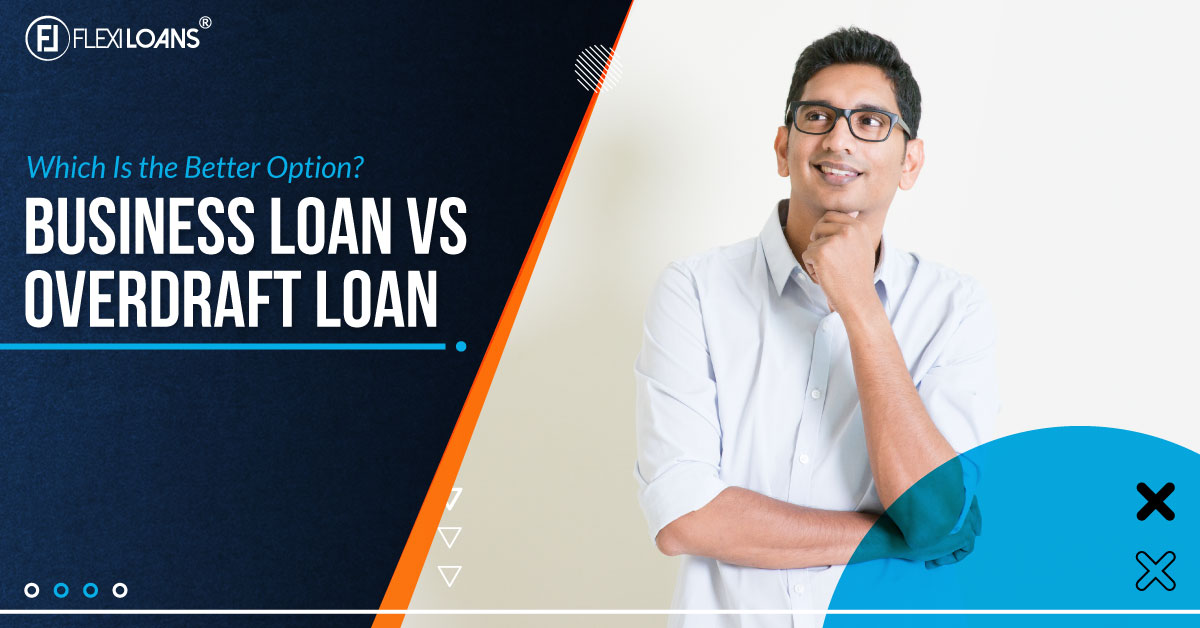Sep 22, 2021

Introduction
To meet short-term working capital requirements, entrepreneurs often borrow money by applying either for overdraft loans or business loans in India. However, many businessmen are still unable to decide between a business loan and an overdraft loan. They are unable to understand which loan to apply for and in what scenarios. Even though both the loans can be taken for the smooth running of business operations, the reasons are different. Furthermore, the interest rates applicable can be calculated using tools such as Business Loan EMI calculators.
In this article, we will explore the difference between business loans and overdraft loans.
What is a Business Loan?
A business loan is a loan for a new business. It is taken for varied reasons, including expanding business, working capital requirements, investing in some property or land, investing in machinery and plant, recruiting staff, employee training, and enhancing stock or inventories.
Working on the Business Loan
When you apply for business loans, the lender approves a loan of the bulk amount at a certain interest rate. The loan amount eligibility is decided based on various factors, such as the borrower’s profile, business vintage, experience, credit history, credit score, and financial status.
There are two primary types of business loans in India:
Secured Business Loans
In secured business loans, the borrower must deposit some sort of surety with the bank for the loan approval.
Unsecured Business Loans
FlexiLoans provides Unsecured business loans that are collateral-free. Only a good credit score is needed to get a loan approved. The unsecured business loan interest rates are comparatively higher than secured business loans. However, it works well for those who do not have collateral to deposit as a security with the bank. It is also known as a business loan without collateral.
Business Loan Eligibility Criteria
Here are the basic business loan eligibility criteria that every financial institution follows:
- The minimum age to apply for a business loan is 24 years; the maximum is 70 years
- Must be a resident of India
- Applicant must be in a running business for at least 3 years
- Must have a good credit score of 750 or above
- Must have valid KYC documents and latest ITR
Documents Required for a Business Loan
- Photo Identity Proof: Duly filled business loan application with passport-size photograph and Aadhaar card, driving license, or passport as identity proof
- Business Proof: Copy of your ownership papers, establishment, trade license, partnership deed agreement, sales tax certificate, or sole proprietorship declaration
- Income Proof: ITR and computation of balance sheet of consecutive two years
- Bank Statements: Latest six months’ bank statements
- KYC Documents: PAN card copy, Aadhaar details, certificate of incorporation
What is an Overdraft Loan?
An overdraft loan works well in financial emergencies where one needs to deal with the short-business requirements. The financial institution defines the overdraft rate of interest and the general fee and varies from one financial institution to another.
According to the Reserve Bank of India, all the current and cash credit account holders are eligible for applying for an overdraft loan of Rs 50,000 per week. It will be only provided if you have a good credit score of 750 or above.
Eligibility Criteria for an Overdraft Loan
- The minimum age to apply for an overdraft loan is 18 years, and the maximum is 65 years.
- It is a short-term credit facility that comes with a repayment tenure of a maximum of 12 months.
- The credit limit set in the overdraft loan is based on your current account value.
How Do Overdraft Loans Work?
The credit limit granted on your set current account is the overdraft limit given to a businessman. One can use the amount as per the limit only. The primary difference between overdraft and term loans is the overdraft limit is a kind of revolving credit. You can repay the amount and continue borrowing as per the financial need.
However, as a businessman, it is crucial to know that overdraft loans are given to those with a good credit score and repayment history. The overdraft loan renews each year. You only need to pay the overdraft fee at the beginning of the financial year. The best part about the overdraft loan is that interest is charged only on the amount borrowed. OD is a flexible financing option and the best solution to meet instant cash requirements.
Overdraft loans are one the most reliable credit facilities offered by banks and other financial institutions. They are critical for coping with short-term working capital requirements. By getting financial support in the form of overdraft in their business current accounts, entrepreneurs can issue a cheque for a higher amount to their clients irrespective of the funds available in their bank accounts.
Comparison Between Business Loans and Overdraft Loans
How to Choose Between Overdraft Loans and Business Loans
| Features | Business Loans | Overdraft Loans |
| Definition | It is a one-time amount borrowed at a fixed interest rate and for a predetermined tenure. | The bank gives an overdraft facility, but there is a certain limit given to the account holder. |
| Nature of the Product | It is borrowed capital | It is a line of credit loan |
| Ideal for | Meets long-term funding requirements | Works best to meet the short-term working capital requirements |
| Interest Charged | Interest applicable on the whole amount | One can withdraw an amount based on the available credit limit. |
| Calculation of Interest | Annually, monthly, or quarterly | Overdraft facility interest rate calculated on a per-day basis |
| Repayment | Fixed monthly EMIs | Any time that you can pay |
| Banking Account | You can apply from any of the banks and NBFCs. It is not necessary to have an existing bank account with the lender. | You must have a current account with the bank. |
How to Choose Between Overdraft Loans and Business Loans
There are several factors based on which you can choose between business loans and overdraft loans.
Loan Amount Requirement
If you need a huge loan amount, go for business loans. It is because the loan amount eligibility of business loans is higher compared to overdraft loans. Overdraft loans work like credit cards. The limit is always less than in business loans.
Interest Rates
The interest applicable on overdraft loans is higher than in business loans. However, the interest applies only to the amount used. In business loans, the interest applies to the entire amount.
Usage
Ideally, overdraft loans work well to meet daily working capital requirements such as salary payments and staff payments. Applying business loans works well when you are planning to invest in big-budget investments.
Loan Repayment
The repayment facility of overdraft loans is more flexible compared to business loans. If you fail to pay the monthly EMI of business loans, it will negatively impact your credit score.
Conclusion
Overall, business loans are the best for long durations and huge purchases for the smooth running of business operations. If you want to boost cash flow or enhance your working capital requirements, apply for overdraft loans. In short, business loans are best to apply for if your purchases are planned. However, for smaller financial emergencies, it is sufficient to avail of an overdraft facility.
Frequently Asked Questions
- How can an overdraft loan work for a business?
The ways overdraft loans prove beneficial for the business are as follows:- It helps in maintaining business solvency.
- It helps in overcoming the external cash flow disruptions.
- It is the best way to meet unexpected business expenses.
- Who all are liable to apply for business loans?
The following entities can apply for a business loan:- Partnership Firm
- Sole Proprietorship
- Private Limited Companies
- Societies
- Closely held Public Limited Companies
- Trusts
- Hospitals, Nursing Homes, Diagnostic Centres, Pathological Labs.
- What is the maximum amount one can apply for a business loan?
One can apply for a business loan of up to Rs 1 crore. It is crucial to understand the loan amount eligibility varies from one financial institution to another.
- Does the overdraft facility fall under the category of loan?
The overdraft facility is loan assistance offered by the bank to the customer at times of financial crisis. It works well in the month-end crisis to make payment of utility or credit card bills.
- Are overdraft loans bad or good?
For coping with the short-term financial requirements, overdraft loans always work well. You are required to pay interest only on the used amount, irrespective of the credit sanctioned. Overdraft loans are flexible and easily accessible in financial emergencies.







